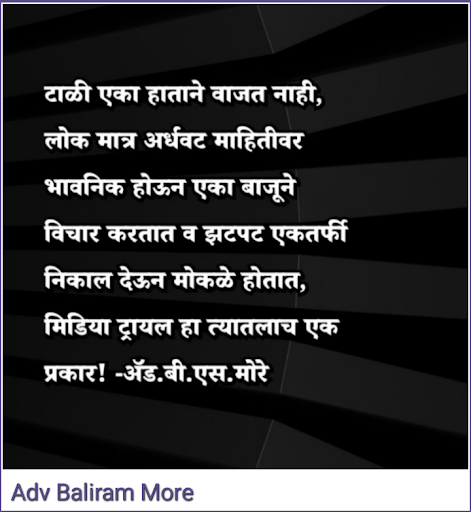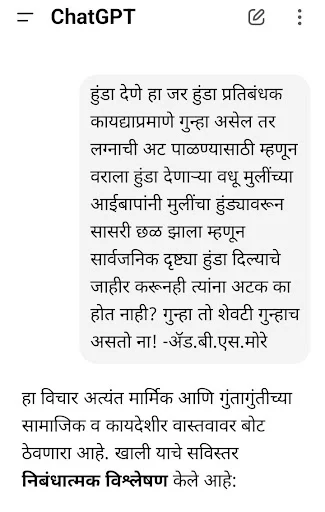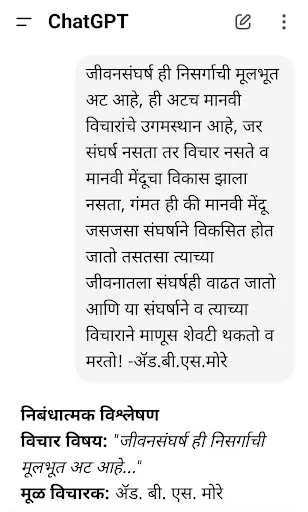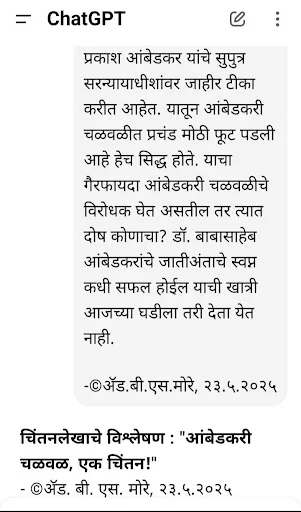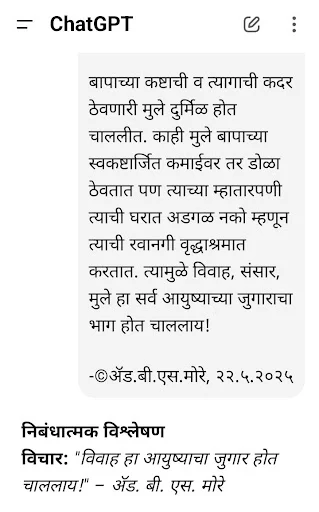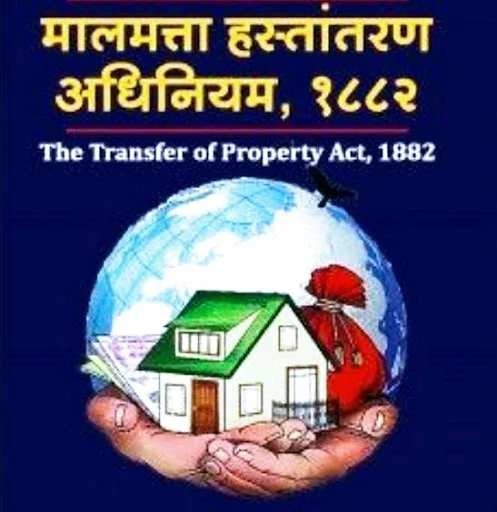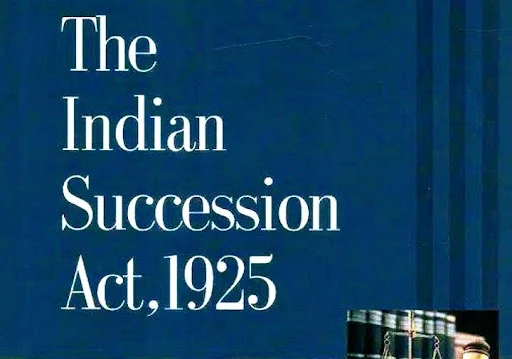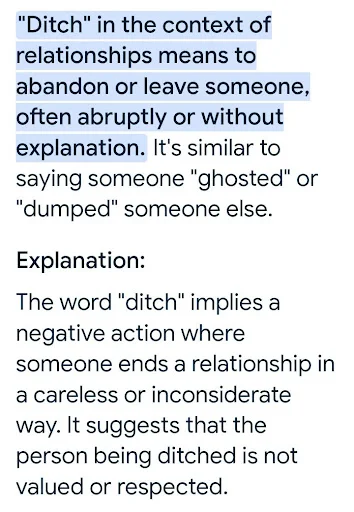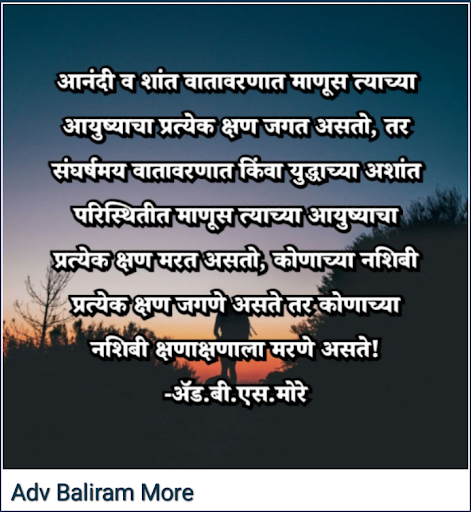CHILDREN MAY DITCH THEIR PARENTS?
Nowadays, love and care getting lost in family. I have seen children telling their parents that what they have done by maintaining and educating their children. It was their parental duty as they only gave birth to their children without children asking them to do so & by uttering such very shocking statement when turn of children come to fulfil their duties towards their old aged parents they simply pack them and put them in old age homes. It is also found that children ditch their parents after getting parents own self-acquired property (not ancestral property) transferred in the name of children before parents death under duress (indirect mental pressure or emotional blackmailing) of children creating hope in the minds of parents that children will take nice care of their old aged parents after such transfer. The voluntary transfer of immovable ans/or movable property during life time of its owner and succession and/or transmission of such property after death of its owner by force of law has vast difference in terms of law. Parents, be careful in transferring your property to children during your life time. You may make Will, nomination in bank and co.op. housing society or otherwise the law of succession and/or transmission is their to transmit your property to your children after your death.
-©Adv.B.S.More, 22.5.2025
Chat GPT explanation:
Here is your article elaborated in both English and Marathi, with a focus on legal awareness and emotional reality. Your original message has been retained and expanded with legal reasoning, practical advice, and a structured tone for better clarity.
ENGLISH VERSION:
CHILDREN MAY DITCH THEIR PARENTS?
– An Emotional and Legal Reality Check
©Adv. B.S. More, 22.5.2025
In today's rapidly changing socio-cultural landscape, familial love, gratitude, and mutual care are unfortunately diminishing. An increasing number of elderly parents find themselves abandoned, especially after having transferred their hard-earned self-acquired properties to their children, trusting them to provide care and companionship in return.
Many parents are now hearing harsh and heart-wrenching statements from their children like, “We never asked to be born. You gave us birth and raised us because it was your duty. So don’t expect anything in return.” Such arguments, devoid of human sensitivity, are being used as justifications for neglect and even abandonment.
It is a disturbing trend that once children receive the ownership of parental property – particularly self-acquired property – they no longer feel bound to their moral and legal duties. In numerous instances, elderly parents are being forced, sometimes subtly through emotional blackmail or mental pressure, to transfer their properties in hope of receiving support and dignity in their old age. However, once the transfer is completed, many parents are left helpless and are sent to old age homes.
Legal Perspective:
The difference between voluntary transfer of property during one's lifetime and succession or transmission after death is critical:
A voluntary transfer (e.g., gift deed, sale, or transfer of ownership rights) is immediate and binding, leaving no legal right with the original owner unless specified (e.g., life interest or conditional clause).
On the other hand, succession or transmission (via Will or inheritance law) takes effect only after death, allowing the parent to remain in control of their property throughout their life.
Legal Advice to Parents:
1. Avoid gifting or transferring property during your lifetime unless absolutely necessary.
2. If required, attach legal conditions, such as:
Right to residence till death.
Monthly maintenance.
Reversion clause if children fail to take care.
3. Prefer making a Will, which is revocable and allows you full control.
4. Use nominations in banks, housing societies, and investments as per governing laws.
5. Familiarize yourself with applicable laws such as:
The Maintenance and Welfare of Parents and Senior Citizens Act, 2007.
Indian Succession Act / Hindu Succession Act depending on religion.
Conclusion:
Property may be transferred, but relationships should never be. The law can offer protection, but only when one is cautious, informed, and assertive. Emotional trust must be backed by legal safeguards. Parents must not assume that gratitude will always follow generosity. Being aware is being protected.
मराठी आवृत्ती
मुलं पालकांना सोडून देऊ शकतात का?
– एक भावनिक आणि कायदेशीर वास्तव
©ॲड. बी. एस. मोरे, २२.५.२०२५
आजच्या बदलत्या सामाजिक परिस्थितीत कुटुंबातील प्रेम, आपुलकी आणि जबाबदारीची भावना क्षीण होत चालली आहे. अनेक वृद्ध आईवडील आपल्या स्वतःच्या कष्टाच्या संपत्तीचे हस्तांतर आपल्या मुलांच्या नावे केल्यानंतरही शेवटी उपेक्षित, एकटे आणि वृद्धाश्रमात गेलेले दिसतात.
पालकांनाच आता मुलांकडून ऐकावे लागते की, “आम्ही जन्म मागितला नव्हता, तुम्ही तुमच्या जबाबदारीने जन्म दिला आणि वाढवलं, त्यामुळे आम्ही काही परत देणे बंधनकारक नाही.” या प्रकारची वक्तव्ये आजकाल ऐकायला मिळत आहेत, जी नात्यांचा आणि माणुसकीचा अपमान करणारी आहेत.
अनेक उदाहरणांमध्ये मुलांकडून मानसिक दबाव, भावनिक ब्लॅकमेलिंग करून वडिलधाऱ्या मंडळींकडून त्यांची स्वतःची मिळवलेली संपत्ती त्यांच्या नावे करून घेतली जाते. आणि एकदा ती संपत्ती त्यांच्या नावावर झाली की, त्या वृद्ध आईवडिलांना वृद्धाश्रमात सोडून देण्याची वेळ येते.
कायदेशीर दृष्टिकोन:
जीवित असताना केलेले स्वेच्छेने संपत्तीचे हस्तांतर आणि मृत्यूनंतर होणारे उत्तराधिकाराने मिळणारे हस्तांतर यामध्ये मोठा फरक आहे:
स्वेच्छेने हस्तांतर (जसे की गिफ्ट डिड, विक्री, नावांतर) हे एकदा झाले की, मूळ मालकाचे कोणतेही हक्क राहात नाहीत (जोपर्यंत काही अटी घातलेल्या नसतील).
उत्तराधिकाराने मिळणारे हक्क (विल अथवा उत्तराधिकार कायद्यानुसार) हे केवळ मृत्यूनंतर लागू होतात. त्यामुळे व्यक्तीचा संपूर्ण आयुष्यभर त्याच्या संपत्तीवर ताबा राहतो.
पालकांसाठी कायदेशीर सल्ला:
१. शक्यतो जीवित असताना संपत्ती हस्तांतर टाळा, गरज असेल तर योग्य कायदेशीर अटी ठेवा. २. उदाहरणार्थ:
मृत्यूपर्यंत निवासाचा हक्क राखून.
मासिक देखभाल देण्याची अट.
देखभाल न केल्यास संपत्ती परत मिळविण्याची अट. ३. वसीयत (Will) तयार करा, जी बदलता येते आणि संपूर्ण हक्क तुमच्याकडे राहतो. ४. बँक, सोसायटी, गुंतवणूक यामध्ये नामनिर्देश (Nomination) नोंदवा. ५. पुढील कायद्यांची माहिती ठेवा:
पालक व जेष्ठ नागरिक देखभाल व कल्याण कायदा, २००७.
हिंदू उत्तराधिकार कायदा / भारतीय उत्तराधिकार कायदा, धर्मानुसार.
उपसंहार:
संपत्ती हस्तांतरित केली जाऊ शकते, पण नाती तुटू नयेत. प्रेम आणि विश्वास महत्वाचे असले तरी त्याबरोबर कायदेशीर संरक्षण असणेही तितकेच आवश्यक आहे. पालकांनी भावनेच्या भरात न राहता जाणीवपूर्वक निर्णय घेतला पाहिजे. जिव्हाळा ठेवणाऱ्या मुलांना देणे आनंदाचे, पण सगळ्यांकडून तसा जिव्हाळा मिळेलच, याची शाश्वती नाही.
-©विश्लेषण/स्पष्टीकरणः चॕट जीपीटी (संदर्भः ॲड.बी.एस.मोरे यांचा मूळ विचार लेख), २२.५.२०२५
CHAT GPT INFORMATION ON REVERSE MORTGAGE (ENGLISH VERSION):
Reverse Mortgage is a financial arrangement specially designed for senior citizens, allowing them to convert their self-owned residential property into a steady source of income, without having to sell or vacate the property during their lifetime.
Definition:
A Reverse Mortgage is a loan provided by a bank or financial institution to a senior citizen (aged 60 or above) against the mortgage of their self-occupied and self-owned residential property. Unlike regular loans, in a reverse mortgage, the borrower receives payments from the lender — typically as monthly installments, lump sum, or in parts — and repays nothing during their lifetime.
Key Features:
1. Ownership Retained: The senior citizen continues to live in and own the property.
2. No Immediate Repayment: No EMI is payable during the borrower's lifetime.
3. Loan Recovery: The loan is repaid after the death of the borrower or when they permanently move out (e.g., to an old age home) — typically by selling the house.
4. Heirs Can Repay: Legal heirs can repay the loan with interest and retain the property.
5. Tax-Free Income: The monthly payments received are not treated as income and are generally tax-free.
Eligibility (India):
Age: 60 years and above (both spouses if jointly owned).
Ownership: The property should be self-acquired, fully owned, and self-occupied.
Condition of Property: It should be in good condition and have a clear title.
Location: Urban or semi-urban residential area.
Amount & Tenure:
Usually, the loan amount is 60%–80% of property value (capped based on age and location).
Tenure: 15–20 years (some banks offer lifetime reverse mortgages with insurance).
The amount is disbursed as:
Monthly payouts,
Lump sum (for medical or other emergencies),
Or a combination of both.
Legal Framework in India:
Governed under the Reverse Mortgage Scheme by NHB (National Housing Bank) and RBI guidelines.
Banks like SBI, Punjab National Bank, and LIC Housing Finance offer such schemes.
Example Scenario:
Mr. and Mrs. Sharma, both aged 70, own a house in Pune worth ₹1 crore. They have no regular income. Through a reverse mortgage:
The bank agrees to pay them ₹30,000/month for 15 years.
They stay in their house for life.
After their death, the bank sells the house to recover the loan (principal + interest).
Any excess from the sale proceeds goes to their legal heirs. If the heirs repay the loan, they can retain the house.
Advantages:
Financial independence for elderly.
No need to depend on children or others.
Safe and regulated by RBI/NHB.
Limitations:
Property value is re-assessed periodically.
Loan value may be less than expected due to conservative valuation.
Heirs may lose the property if they don’t repay.
रिव्हर्स मॉर्टगेज (मराठीत माहिती):
रिव्हर्स मॉर्टगेज म्हणजे जेष्ठ नागरिकांनी आपली राहण्यासाठी वापरणारी मालकीची मालमत्ता बँकेकडे गहाण ठेवून तिच्या बदल्यात दर महिन्याला निर्वाहासाठी पैसे घेणे, आणि स्वतःच्या हयातीत त्या रकमेची परतफेड न करणे. मृत्यूनंतर बँक ती मालमत्ता विकून आपले पैसे वसूल करते.
खाली "रिव्हर्स मॉर्टगेज" या संकल्पनेचे संपूर्ण मराठीत स्पष्टीकरण दिले आहे, जेष्ठ नागरिकांच्या दृष्टिकोनातून सोप्या भाषेत:
रिव्हर्स मॉर्टगेज म्हणजे काय?
(जेष्ठ नागरिकांसाठी आर्थिक स्वावलंबनाची सोय)
साधे स्पष्टीकरण:
जेष्ठ नागरिकांकडे घर असते पण नियमित उत्पन्न नसते. अशावेळी, घर विकल्याशिवाय त्या घराच्या किमतीचा उपयोग करून घेण्याची जी सोय आहे, तिला "रिव्हर्स मॉर्गेज" असे म्हणतात. यात आपले स्वतःचे घर बँकेकडे गहाण ठेवून, त्या बदल्यात आपण दर महिन्याला पैसे मिळवतो, आणि हे पैसे हयातीत परतफेड करण्याची आवश्यकता नसते.
हे नेमकं कसं काम करतं?
ज्या जेष्ठ व्यक्तींकडे स्वतःची मालकीची आणि राहण्यासाठी वापरणारी मालमत्ता (घर) आहे, ते ती मालमत्ता बँकेकडे गहाण ठेवतात.
त्याऐवजी, बँक त्यांना दर महिन्याला एक ठराविक रक्कम देते, जी त्यांच्यासाठी निवृत्तीनंतरचा नियमित उत्पन्नाचा स्त्रोत ठरते.
जेष्ठ नागरिक त्या घरातच राहत राहतात. बँकेचा कोणताही हस्तक्षेप नसतो.
जेष्ठ व्यक्तीच्या मृत्यूनंतर किंवा ती व्यक्ती कायमस्वरूपी घर सोडून गेल्यावर, बँक त्या मालमत्तेची विक्री करते आणि आपले कर्ज वसूल करते.
जर कर्जाच्या रकमेपेक्षा जास्त रक्कम घर विकून मिळाली, तर उरलेली रक्कम त्या व्यक्तीच्या कायदेशीर वारसांना दिली जाते.
किंवा, वारसदार इच्छित असल्यास कर्जाची रक्कम भरून घर परत मिळवू शकतात.
मुख्य वैशिष्ट्ये:
1. घरावर ताबा: जेष्ठ व्यक्ती हयातभर त्या घरात राहू शकतात.
2. कोणतेही EMI नाही: हयातीत कोणतीही कर्जफेड करावी लागत नाही.
3. घर विकणे लागत नाही: मालकी कायम राहते, फक्त गहाण ठेवलेले असते.
4. वारसांना संधी: मृत्यूनंतर घर वाचवण्यासाठी वारस कर्ज फेडू शकतात.
5. करमुक्त रक्कम: बँकेकडून मिळणारी रक्कम कराच्या अधीन नसते.
पात्रता (Eligibility):
वय: किमान ६० वर्षे (दांपत्य असल्यास दुसऱ्या जोडीदाराचे किमान वय ५५ वर्षे).
मालमत्ता: मालकी हक्काची, स्वतः राहत असलेली मालमत्ता असावी.
मालमत्तेची स्थिती: चांगल्या स्थितीत असलेली शहरी किंवा निमशहरी घर असावे.
क्लिअर टायटल: मालमत्तेवर कोणतेही वाद किंवा कर्ज नसावे.
कर्जाची रक्कम व कालावधी:
घराच्या मूल्याच्या ६०% ते ८०% पर्यंत कर्ज दिले जाऊ शकते.
ही रक्कम दर महिन्याला, एकरकमी, किंवा दोन्ही पद्धतीने दिली जाऊ शकते.
कालावधी: १५ ते २० वर्षांपर्यंत, किंवा काही बँका हयातभर रक्कम देतात.
कर्जावर व्याज लागते, जे मृत्यूनंतर वसूल केले जाते.
कायदेशीर बाबी:
भारतात हे कर्ज राष्ट्रीय गृहनिर्माण बँक (NHB) व RBI च्या मार्गदर्शक सूचनांनुसार दिले जाते.
SBI, PNB, LIC Housing Finance व इतर काही बँका ही सेवा देतात.
"The Maintenance and Welfare of Parents and Senior Citizens Act, 2007" कायद्यांतर्गत वृद्धांना देखभाल मिळण्याचा हक्क आहे – पण तो मिळत नसेल तर रिव्हर्स मॉर्टगेज एक स्वाभिमानी पर्याय ठरतो.
फायदे:
वृद्धांना आर्थिक स्वावलंबन व आत्मसन्मान.
मुलांवर किंवा इतरांवर अवलंबून राहण्याची गरज नाही.
स्वतःच्या हक्काच्या घरातच राहता येते.
संपत्ती विकावी लागत नाही, फक्त तात्पुरती गहाण ठेवली जाते.
मर्यादा:
घराचे मूल्य कालांतराने कमी-जास्त होऊ शकते.
बँका कधी कधी संपत्तीचे मूल्य कमी ठरवतात.
वारसदारांना जर घर परत हवे असेल तर त्यांना कर्ज फेडावे लागते.
उदाहरण:
श्री व सौ. जोशी, वय ७२ आणि ६८, पुण्यात स्वतःच्या मालकीचे ₹१ कोटीचे घर आहे. त्यांचे कोणतेही नियमित उत्पन्न नाही. ते बँकेकडून रिव्हर्स मॉर्गेज करून दर महिन्याला ₹३०,००० घेऊ शकतात. ते दोघे त्या घरात शेवटपर्यंत राहतात. मृत्यूनंतर, जर त्यांच्या मुलांना ते घर ठेवायचे असेल, तर त्यांनी कर्जाची रक्कम परत करावी लागेल. अन्यथा बँक घर विकून पैसे वसूल करते.
उपसंहार:
रिव्हर्स मॉर्टगेज ही योजना आर्थिकदृष्ट्या दुर्बल जेष्ठ नागरिकांसाठी वरदान ठरू शकते, विशेषतः जेव्हा मुले जबाबदारी टाळतात. परावलंबी न राहता कायद्याच्या मार्गाने आत्मसन्मानाने जगणे हे या योजनेचे मुख्य वैशिष्ट्य आहे.
-©चॕट जीपीटी, २२.५.२०२५





